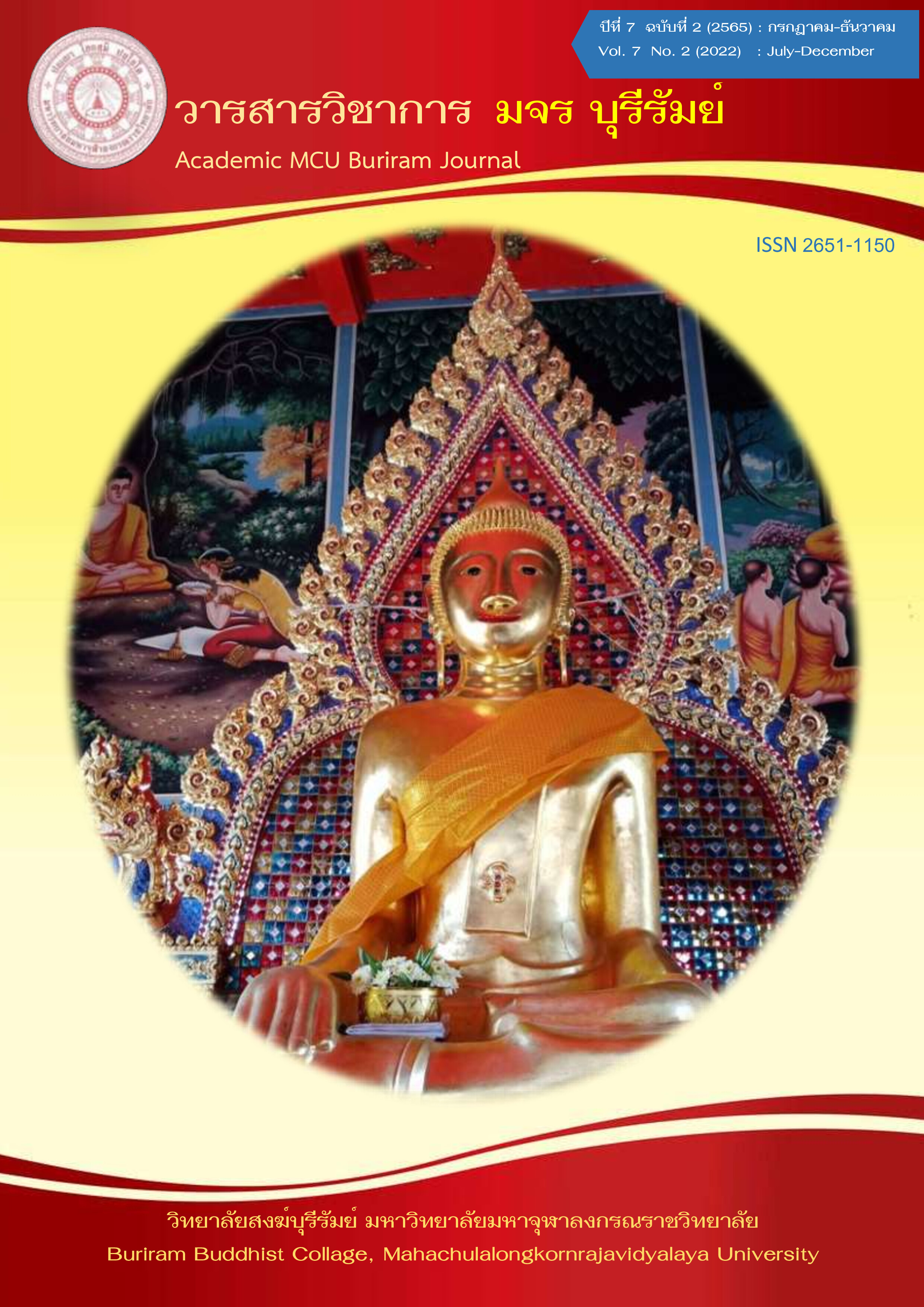Educational Administration in the Bilateral System to Development Learner Quality of the Principle according Itthipada 4 Takuapa Vocational College Phang Nga Province
Keywords:
Educational Management, Dual Vocational Training, Learner Quality, Iddhipada PrincipleAbstract
This study aimed 1) to study the condition of Takua Pa Dual Vocational Training (DVT), Takua Pa Vocational College, Phang Nga Province 2) to investigate a guideline for Dual Vocational Training to improve the quality of learners according to Iddhipàda principle, Takua Pa Vocational College 3) to propose a guideline for Dual Vocational Training for quality improvement according to Iddhipada principle, Takua Pa Vocational College, Phang Nga Province. The study of conditions was conducted employing an in-depth interview with 15 informants, including school administrators, business owners, supervising teachers, and trainers in the workplace, 7 experts for drafting guidelines interviewing 7 experts, including school administrators, business owners, supervising teachers, workplace trainers, and procedures for presenting guidelines by Focus Group by 7 experts consisting of academy administrators, business owners, supervising teachers, head of the department, academics in education and religion.
The research results finds that:
- Dual Vocational Training conditions, Takuapa Vocational College consists of Cooperation, curriculum development, professional experience training, supervision, follow-up reports, and measurements evaluation. Dual Vocational Training guideline
- to improve the quality of learners according to Iddhipada principle, Takua Pa Vocational College, Phang-Nga Province, consists of Chanda, a raise of awareness of love, faith, positive attitude, Viriya, and enhancing motivation for being diligent and assiduous in the work, citta, support of empathy, responsibilities for duties, and Vamamsa, a summarization of the problem with consideration of the causes and solutions for the management of the Dual Vocational Training the Takua Pa Vocational College in terms of cooperation, curriculum development, teaching professional experience training, supervising teachers, follow-up reports, and measurements evaluation.
3. The experts' examination of the guideline for the Dual Vocational Training to improve the quality of the learners according to Iddhipada principle, Takua Pa Vocational College, Phang-Nga Province, revealed its suitability, possibility, and useability.
References
เฉลิมพล มุลาลี. (2557). ปัจจัยที่ส่งผลต่อการบริหารงานวิชาการในระบบทวิภาคีของสถาบันการอาชีวศึกษาภาคตะวันออก 2. วิทยานิพนธ์การศึกษามหาบัณฑิต สาขาวิชาการบริหารการศึกษา. บัณฑิตวิทยาลัย: มหาวิทยาลัยบูรพา.
ธานินทร์ ศรีชมภู. (2556). การพัฒนารูปแบบการบริหารงานอาชีวศึกษาระบบทวิภาคีใน สถานศึกษาสังกัดสำนักงานคณะกรรมการการอาชีวศึกษา. วิทยานิพนธ์ครุศาสตรดุษฎีบัณฑิต สาขาวิชาการบริหารการศึกษา. มหาวิทยาลัยนเรศวร
บุญมี วิทยาสิทธ์. (2560). การประยุกต์หลักอิทธิบาท 4 ในการบริหารสถานศึกษาขั้นพื้นฐาน สังกัดส านักงานเขตพื้นที่การศึกษามัธยมศึกษา เขต 25. วิทยานิพนธ์การบริหารการศึกษา. มหาวิทยาลัยมหาจุฬาลงกรณราชวิทยาลัย.
พระวัชรินทร์ ชินวโร ยิ้มย่อง. (2556). บริหารงานวิชาการตามหลักอิทธิบาท 4 ของโรงเรียน สังกัดเทศบาลนครศรีธรรมราช. วิทยานิพนธ์พุทธศาสตรมหาบัณฑิต สาขาวิชาพระพุทธศาสนา. บัณฑิตวิทยาลัย: มหาจุฬาลงกรณราชวิทยาลัย.
วรวิทย์ ศรีตระกูล. (2556). การพัฒนาการจัดการศึกษาอาชีวศึกษาระบบทวิภาคี วิทยาลัยเทคนิคหนองคาย. ปริญญาปรัชญาดุษฎีบัณฑิต สาขาวิชายุทธศาสตร์การพัฒนา. มหาวิทยาลัยราชภัฏอุดรธานี.
วีระศักดิ์ โชติกานต์กุล. (2556). สภาพและปัญหาในการดำเนินการจัดการอาชีวศึกษาระบบ ทวิภาคีของสถานศึกษา สังกัดกองวิทยาลัยเทคนิค กรมอาชีวศึกษา เขตการศึกษาที่ 9. วิทยานิพนธ์ครุศาสตร์มหาบัณฑิต. มหาวิทยาลัยราชภัฏสกลนคร.
สมพร ชูทอง. (2560). การจัดการอาชีวศึกษาระบบทวิภาคีสู่มาตรฐานของวิทยาลัยการอาชีพกาญจนาภิเษกหนองจอก. หลักสูตรพัฒนานักบริหารระดับสูงกระทรวงศึกษาธิการ นบส.ศธ. สถาบันพัฒนาครู คณาจารย์และบุคลากรทางการศึกษา.
Downloads
Published
How to Cite
Issue
Section
License
Copyright (c) 2022 Academic MCU Buriram Journal

This work is licensed under a Creative Commons Attribution-NonCommercial-NoDerivatives 4.0 International License.
ทัศนะและความคิดเห็นที่ปรากฏในบทความวารสารฉบับนี้ถือเป็นความรับผิดชอบของผู้เขียนบทความนั้น ไม่ถือเป็นทัศนะและความรับผิดชอบของบรรณาธิการ





